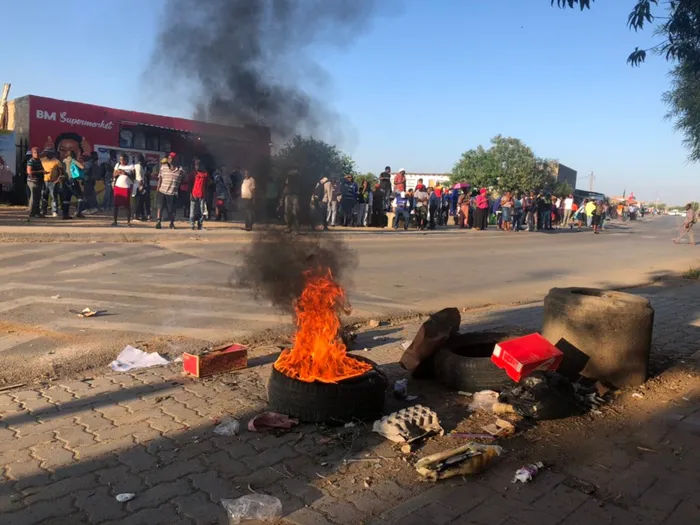Diepsloot, Diepkloof hostel protests an indictment of leadership failures

File Picture: @LocalManShrgd/Twitter - Diepsloot residents stand around as a tyre burns. Spatial planning must directly attack apartheid geography, ensuring that the black working-class and the poor live in richer areas and in economic hubs where they can participate fully in the country’s economy, the author says.
By Trevor Ngwane
Recent protests in Diepkloof and Diepsloot have raised many questions and concerns about the frustration and anger that besets working-class communities in South Africa. Fears about the possibility of the total breakdown of law and order in the country abound.
People are reminded of the chaos and utter desperation that was seen in the July 2021 mass looting of shopping malls, which left thousands of businesses destroyed and hundreds of people dead. What are the future horrors that lie in store for South Africa? How can these be averted?
The Diepkloof Hostel protests underline how the past shapes the present and the danger of it shaping the future. Hostels symbolise the continuities of apartheid oppression and exploitation in the post-apartheid era. They are a form of working-class accommodation created to control, oppress and dehumanise black people who migrated from the rural areas to work in ‘whites only’ cities and towns.
The aim was to create a compliant and cheap supply of black labour to the capitalist sector without affording workers their rights as residents or citizens in the areas where their workplaces were located. Their continued existence suggests that the more things change, the more they remain the same.
Living conditions in Diepkloof Hostel are deplorable: missing roofs, falling walls, bucket toilets, communal taps, unreliable electricity, and many other problems that make life difficult and arguably undermine the residents’ dignity.
On taking power in 1994, the ANC committed itself to transforming hostels into family units but has done so at an infuriating snail’s pace. The routine failure to meet its targets and thus honour its promises has resulted in a loss of trust in government. It introduces uncertainty, undermines hope and tramples on the vision of a better life for all.
The community mobilisation against crime in Diepsloot has become synonymous with xenophobic sentiment and attacks on so-called foreigners. The murder of Elvis Nyathi, a Zimbabwean migrant, during a community-led crime and immigrant clean-up last year was a criminal act that arguably was an addition rather than a reduction of the crime rate in the area.
Recently, Diepsloot local leader and anti-crime fighter Makoti John Makola was allegedly murdered, raising fears and emotions that have fuelled the recent protests in the area and added to the uncertainty, instability and insecurity. It raises questions about the socio-economic conditions and everyday hardship and suffering that have become normalised in this area.
Diepsloot is largely a creation of the post-apartheid era. It came into existence when the ANC government relocated people from Zevenfontein and Alexandra, many of them against their will.
Home to about 150 000 people, the area has arguably become a hell hole for many residents; crime-ridden, overcrowded, poorly serviced, poorly governed and with high unemployment and poverty rates, a stone’s throw away is the ultra-rich Dainfern golf estate, underlining the high inequality level that reflects how the rich continue to get richer and the poor poorer in South Africa.
With the 2024 elections around the corner, we can expect an increase in protest activity, even uprisings, as people reflect on their intolerable living conditions and untenable economic situation. The question is whether the ANC government is willing and able to improve the everyday lives of the millions of working-class and poor people in South Africa.
The experiences of Diepkloof and Diepsloot do not give much hope. The ANC seems to have continued where the apartheid state left off: making sure that the capitalist machine continues to get a steady supply of cheap black labour and thus make its profits.
To significantly improve the lives of the masses will require a massive redistribution of wealth in South Africa and the world. Spatial planning must directly attack apartheid geography, ensuring that the black working-class and the poor live in richer areas and in economic hubs where they can participate fully in the country’s economy.
Economic and labour policies must be radically changed towards achieving full employment to fight the unsustainable rates of poverty, unemployment and inequality. Hostels and other relics of the apartheid past must be eradicated or otherwise transformed to ensure a rupture with past oppressions and exploitations. Is the ANC government able and capable to implement these policy changes?
If the ANC cannot and will not challenge capitalist interests and do what is necessary to meet the needs of the majority, then it must, in the words of Leon Trotsky, be thrown into the dustbin of history.
*Trevor Ngwane is Director of the Centre for Sociological Research and Practice at the University of Johannesburg.